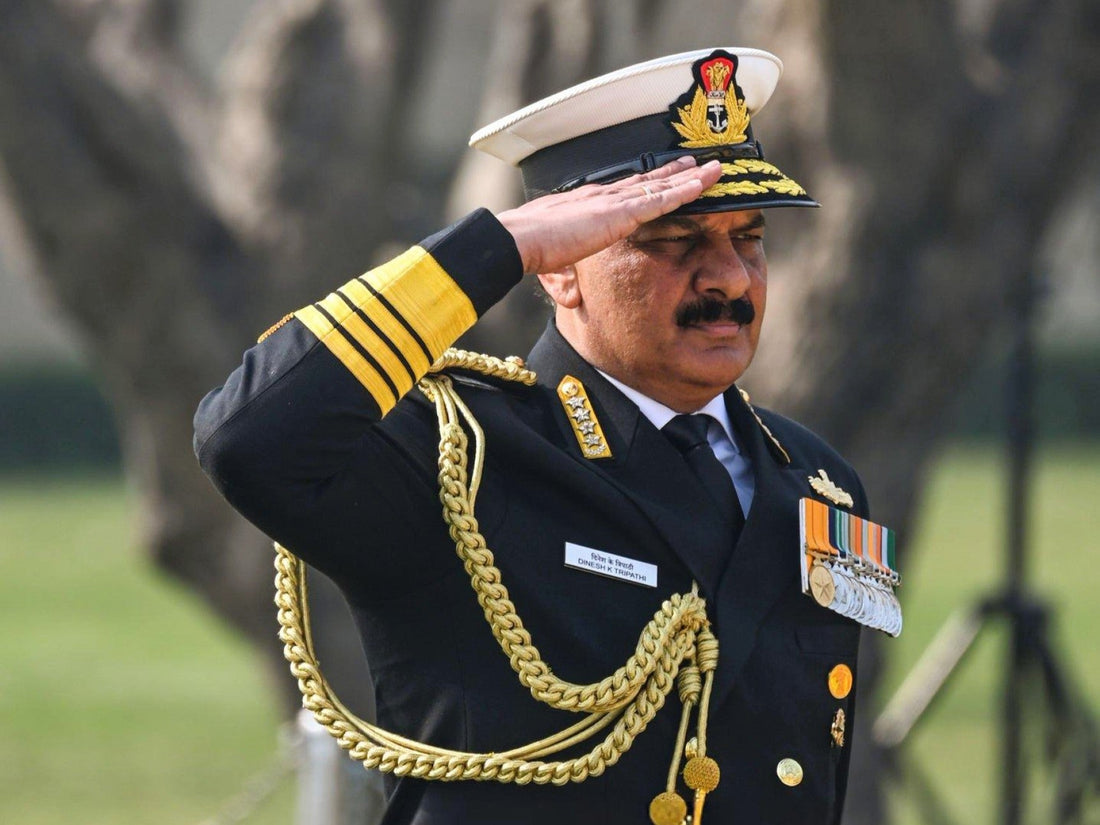How Much is the Salary of Indian Navy Chief?

The role of the Chief of the Naval Staff (CNS) in the Indian Navy is not only one of immense responsibility but also one that carries significant prestige and compensation. This esteemed position, held by a four-star Admiral, symbolizes the pinnacle of naval leadership within India’s maritime forces.
Understanding the salary and compensation of the CNS can provide insights not only into the financial structure of military leadership in India but also into the broader context of the nation's defence strategy and the significance placed on naval power.
Indian Military Academy IMA Coffee Mug
Rs. 699.00
Sale price
Rs. 499.00
NDA Service Before Self Coffee Mug
Rs. 699.00
Sale price
Rs. 499.00
Officers Training Academy OTA Chennai Coffee Mug
Rs. 699.00
Sale price
Rs. 499.00
Indian Naval Academy INA Ezhimala Coffee Mug
Rs. 699.00
Sale price
Rs. 499.00
Historical Context
The Indian Navy has a rich history dating back to ancient times, with naval warfare existing as early as the 6th century BC. However, the modern Indian Navy, formed post-independence in 1947, has evolved significantly over the decades, responding to new threats and the changing dynamics of maritime power. The CNS has always been a pivotal role in this evolution, particularly in strategic planning, operational readiness, and inter-service cooperation.
The position of CNS was officially established in 1955 with the appointment of Admiral R.D. Katari as the first Chief of the Naval Staff. Over the years, the role has adapted to encompass broader responsibilities, including the modernization of the fleet, enhancing maritime security, and increasing naval diplomacy with other nations. The compensation of the CNS, therefore, not only reflects the rank but also signifies the importance of naval leadership in India’s defence framework.
Also Read: How Much is the Salary of Indian Army Chief?
Monthly Salary and Pay Structure
The monthly salary of the Chief of the Naval Staff is ₹250,000 (approximately US$2,900). This figure is significant, given that it places the CNS within Pay Level 18 of the Indian government's pay scale structure, which is reserved for the highest-ranking officials in various sectors, including defence, home affairs, and other critical areas. Here's a breakdown of this aspect:
Key Components of the Salary Structure
- Basic Salary: The core salary for the CNS is ₹250,000, which is a substantial amount in the context of government pay in India. This pay level is crucial for attracting and retaining talented individuals in leadership roles, particularly in the highly specialized field of naval defence.
- Pay Level: The Pay Level 18 designation aligns the CNS with similar ranks in the Army and Air Force, ensuring equitable compensation across India's military branches.
- Increments and Promotions: Within this Pay Level, the CNS can expect annual increments and potential promotions, reflecting their service and contributions over time.
Additional Benefits and Allowances
While the basic salary is an important aspect of the CNS's compensation, it is complemented by a range of additional benefits and allowances, designed to ensure that high-ranking officers' needs are met both professionally and personally. The specifics of these benefits can vary, but they generally include:
- Housing Allowance: Senior military officers often receive a significant housing allowance or are provided with government accommodation in high-profile areas.
- Transport Allowance: Given the size of the responsibilities, there are transport benefits that facilitate movement as needed.
- Healthcare: Comprehensive healthcare benefits for the CNS and their family are standard, ensuring access to the best medical resources.
- Pension and Retirement Benefits: The CNS, after serving a full term, is also entitled to a generous pension, which is crucial for financial security post-service.
Also Read: How Much is the Salary of Indian Air Force Chief?
Importance of Naval Leadership
The role of the CNS transcends beyond just administrative duties; it plays a vital part in shaping national security policies and strategy. Given the geopolitical landscapes and maritime challenges India faces, the CNS functions as the principal naval advisor to the Minister of Defence and the Prime Minister, making strategic decisions that impact the nation directly.
SSB Interview Books Power Pack: 4 Must Read Books for Defence Aspirants
Rs. 1,760.00
Sale price
Rs. 1,399.00
Let's Crack SSB Interview Book [Paperback]
Rs. 390.00
Sale price
Rs. 360.00
Breaking The Code of SSB Psychological Tests [Paperback]
Rs. 390.00
Sale price
Rs. 360.00
OIR Test & PPDT - SSB Interview Screening Test - Stage 1 Testing [Paperback]
Rs. 490.00
Sale price
Rs. 375.00
Case Studies
The real-world implications of the CNS's decisions are profound. For instance, under the leadership of Admiral Sunil Lanba, who served from 2016 to 2019, the Indian Navy made significant strides in enhancing its operational capabilities. This period witnessed intensive naval exercises with other countries, improvements in tracking and counter-narcotics operations, and an overall push towards indigenization through programs like ‘Make in India.’
His term also saw the introduction of new submarines and aircraft, alongside the planned expansion of the Navy's fleet to enhance India’s maritime security. These decisions not only underscore the CNS's influence but also signify the high stakes of military leadership in a rapidly changing geopolitical environment.
Statistical Data and Research Insights
According to data compiled from the Ministry of Defence, as of 2021, the Indian Navy consists of over 67,000 active personnel and around 150 vessels, including aircraft carriers, submarines, frigates, and destroyers. These numbers highlight the scale of operations the CNS is responsible for.
The Indian Navy received a record budget allocation of approximately ₹97,149.80 crore (about $12.3 billion), marking the first time its budget surpassed ₹95,000 crore. This allocation represents around 19.76% of the overall defence budget of ₹4,91,732.30 crore for 2025-26. Capital expenditure for the Navy was set at a record ₹63,000 crore, nearly double the capital budget from FY 2021-22 (₹32,050 crore).
Comparative Analysis
When juxtaposed against military leadership salaries in other major economies, the CNS’s monthly salary may appear modest. For instance, the Chief of Naval Operations (CNO) in the United States Navy earns significantly more, benefiting from a much larger defence budget and an advanced compensation framework.
However, it is critical to consider the contextual differences in the economic environments, living costs, and military traditions of each country. The CNS's salary, when assessed against India’s cost of living and the current economic scenario, offers a reasonable remuneration package that aligns with the nation's military ethos and budgetary constraints.
Challenges and Solutions
While the CNS enjoys a substantial salary and benefits, this role comes with its own challenges:
- Operational Readiness: Maintaining high levels of operational readiness amidst budget constraints and geopolitical tensions.
- Resource Allocation: Advocating for adequate funding for modernization and acquiring the latest technology in naval warfare.
- Personnel Welfare: Ensuring the welfare of Navy personnel and their families, thereby maintaining morale and readiness.
To address these challenges, potential solutions could include:
- Strategic Partnerships: Strengthening ties with allied nations, which could augment India’s naval capabilities through training and shared technology.
- Indigenous Development: Promoting 'Make in India' initiatives to boost domestic defence production, thereby alleviating some financial pressure while advancing self-reliance.
- Public Awareness Campaigns: Enhancing the visibility of naval operations can foster a greater understanding of the Navy's strategic significance among the general populace, potentially leading to increased support and funding.
SSB Interview Study Material 2025 [ Pack of 17 eBooks ]
Rs. 1,313.00
Sale price
Rs. 499.00
Thematic Apperception Test (TAT) Part 1 eBook [100+ Stories]
Rs. 150.00
Sale price
Rs. 139.00
SSB Lecturette Topics Part-1 eBook [100 Topics]
Rs. 149.00
Sale price
Rs. 125.00
20 Practice Sets For OIR Test eBook - [1000+ Questions Included]
Rs. 250.00
Sale price
Rs. 199.00
Future Trends and Predictions
As India gears up to expand its maritime reach, the responsibilities of the CNS will evolve. Trends such as increased naval patrolling in the Indian Ocean Region, the growing significance of cyber warfare, and the incorporation of artificial intelligence in naval operations will shape the future landscape of naval leadership.
Moreover, in light of climate change, the implications of rising sea levels and increased maritime traffic will necessitate a redefined naval strategy focusing on environmental security and humanitarian missions, which are likely to come under the auspice of the CNS.
Conclusion
The salary of the Chief of the Naval Staff in the Indian Navy is indicative of the significant responsibilities associated with the position as well as the government's recognition of the role's strategic importance. With a monthly salary of ₹250,000, complemented by a suite of benefits, the CNS not only leads the Navy's operational capabilities but also plays a crucial part in shaping national security policy.
As India navigates through the complexities of geopolitical dynamics and rapidly evolving maritime challenges, the role of the CNS will undoubtedly become more critical, necessitating capable leadership that is reflected in both the salary and the comprehensive support provided to this pivotal position. The continuous evolution of the Indian Navy, alongside the modern challenges it faces, underlines the importance of such leadership in securing India's maritime sovereignty and promoting regional peace and stability.
In a world where maritime power is increasingly paramount, an engaged and informed public is essential to support the strategic developments spearheaded by the CNS and the broader naval command structure. This awareness is vital, especially when it comes to the allocation of resources and ensuring adequate preparation for the future of India’s naval forces.










![Let's Crack SSB Interview Book [Paperback]](http://shop.ssbcrack.com/cdn/shop/files/ssb-books.webp?v=1736351621&width=533)







![Thematic Apperception Test (TAT) Part 1 eBook [100+ Stories]](http://shop.ssbcrack.com/cdn/shop/files/TAT-ebook-part-1-ssbcrack_051ae49c-43ea-4eb4-95c7-0fa0bfa2a639.jpg?v=1735540406&width=533)


















